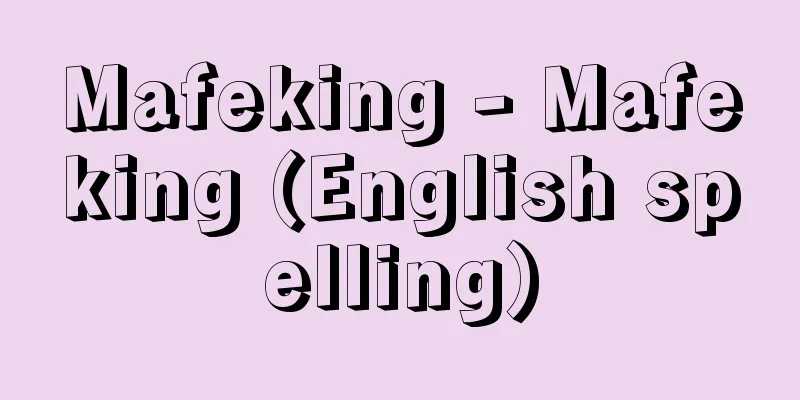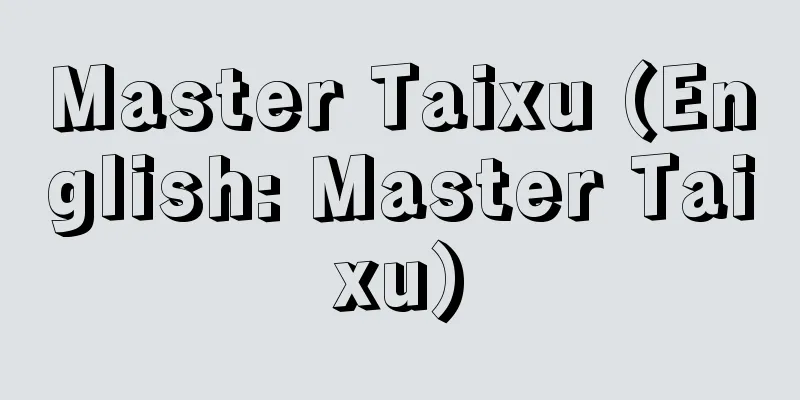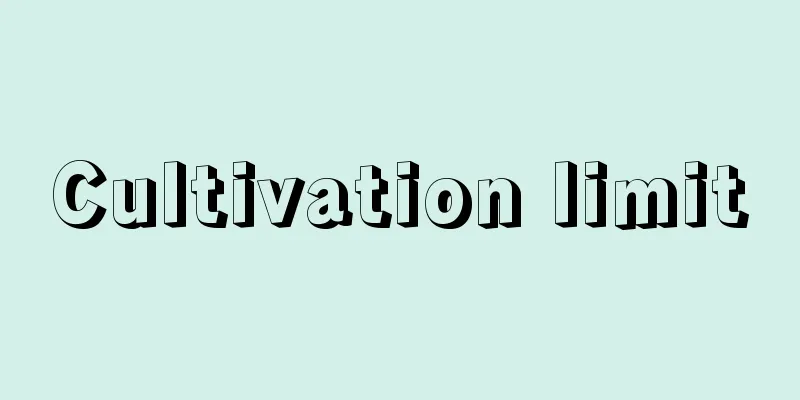Social contract theory - English

|
A modern political thought that states that humans are born with the right to freedom and equality, and that in order to better guarantee these rights, it is necessary to establish a political society (state (commonwealth)) governed by the "rule of law" through mutual contract (agreement), and that it presents a democratic way of resolving the relationship between "power" and "freedom," which is the fundamental problem of modern states, that is, how should the political institutions established to run political society be exercised to protect individual freedom and safety of life? It is a political theory that explains the legitimacy and reason for the existence of the modern state that emerged during the civil revolutions of the 17th and 18th centuries, and its representative theorists are Hobbes, Locke, and Rousseau. [Hiroshi Tanaka] Premodern Covenant TheoryThe contractual idea that power is based on the "consent of the people" was already advocated during the period of absolutism in the 16th century, mainly in continental Europe, by Jesuit and Calvinist theologians, jurists, and political scientists in Spain, France, and Italy. For example, Jesuit theorists such as Molina, Suarez, and Mariana in Spain, Bellarmine in Italy, and Parsons in England argued that while the Pope was directly appointed by God, royal power was derived from the people and was limited by the terms of the original covenant and the purpose of preserving the community, and therefore papal power was superior to secular power; therefore, pagan (Protestant) princes could be dethroned or killed by their subjects at the command of the Pope. On the other hand, Calvinist theorists stated that the position of the king was established by the people and that the government was established based on a contract, and the Scottish theorists Knox and Buchanan, as well as the French Huguenots' "Against Tyrants" (1579), justified popular revolts and the murder of tyrants (De tyrannicale) and the dethronement of pagan (Catholic) monarchs. Although both parties used the primitive contract theory, the main theme here was merely a debate over issues such as "religion and politics," that is, Rome and absolute monarchs, Geneva and secular monarchs, or Catholic monarchs versus the people, or Protestant monarchs versus the people, and it could not be said to be a modern political theory in the sense that it was not a political theory constructed from the standpoint of "man" or the "people," a group of "man." [Hiroshi Tanaka] Hobbes' Contract TheoryThe modern theory of social contract was first constructed by Hobbes, who wrote Leviathan (1651) during the Puritan Revolution in the mid-17th century. He said that the most important thing for humans is the preservation of life (self-preservation), and that humans have the natural right (natural right) to do anything to survive, for example, to kill other people. However, humans once lived in a state of nature where laws and governments were unknown, but now, if each person exercises their natural right, a dangerous state has arisen in which they kill each other (a state of war of all against all). In this situation, even though humans have natural rights for self-preservation, they are actually in danger of losing their lives. Therefore, Hobbes says that humans need to ensure peace by following the conditions for self-preservation that the voice of reason in their hearts tells them, that is, the teachings of natural law. Therefore, humans make a contract, give up their natural rights, and pool their power to create a political society with greater collective power, giving the authority to exercise that power (the highest power, or sovereignty) to one person or a small group of people (the sovereigns), entrusting them with enacting laws to guarantee the freedom and safety of each person's life, and each person is to live in peace and security by obeying those laws. This is Hobbes's basic idea. Hobbes' political theory contains almost all of the basic principles of democratic thought in modern nations. For example, respect for life = respect for basic human rights, the establishment of a political society (nation) by consent and contract = popular sovereignty, the enactment and enforcement of laws by the sovereign = the rule of law, and the establishment of peace as the purpose of establishing a political society. Hobbes is said to say that the sovereign should be given strong power and that the people should not rebel against the sovereign, so he is often criticized as an advocate of absolute monarchy. However, Hobbes's sovereign is the representative personality of the collective people. The power and authority of the sovereign himself or the collective is superior to that of feudal lords, churches, feudal assemblies, guilds, and even absolute monarchs, and the sovereign exercises the power he is given to ensure the freedom and safety of the people. Since the purpose of exercising power is to ensure the safety of the people's lives, any legislation that goes against that purpose is a violation. The actions of a sovereign are not unlimited like those of an absolute monarch or dictator. Hobbes stated this by saying, "The civil laws (the laws of each nation) must not contradict the content of the natural laws (the conditions for the preservation of human life and peace). Any parts that violate them are void." Therefore, obeying the orders of the sovereign, that is, the laws, is a natural obligation that the people must observe in order to realize the purpose of a political society established by contract - peace and security. Without the establishment and understanding of such political ideals on the part of both rulers and the governed, the "political world" would quickly become despotism or dictatorship, or would fall into anarchy. [Hiroshi Tanaka] Locke's Contract TheoryFollowing Hobbes' example, Locke also begins by describing the state of nature. Unlike Hobbes, Locke's state of nature is a peaceful state. In contrast, it has been said that Hobbes depicted the state of nature as a state of conflict, and therefore needed a strong sovereign to stop it, and Hobbes has been considered an authoritarian, but as mentioned above, this idea is incorrect. Hobbes is saying that humans should stop trying to protect themselves, in other words, put down their weapons and submit to the laws made by a single authority. It can be said that the political measures taken during the Meiji Restoration, such as the establishment of unified rule by the Meiji government by abolishing the feudal domains and establishing prefectures, and the implementation of the sword ban for the samurai class, were the very path to the formation of a modern nation that Hobbes spoke of. Locke's state of nature is said to be a peaceful state in the early days due to the existence of natural law that teaches us to suppress desires, but once humans invented money and began to accumulate property (private property), problems such as fighting, robbery, and fraud arise. Locke explains that people formed political societies (communities) by entering into contracts to protect their property rights (property - including life, liberty, and property as a means of livelihood). In this sense, Locke can be said to have developed his social contract theory from the perspective of the emerging middle class, which was striving to create and accumulate capital at the time. Locke goes on to say that the most important political institution in maintaining the safety of the community is the legislative branch, and that the British Parliament, consisting of the King, the House of Lords, and the House of Commons, has the highest power, and that if a conflict arises between the legislative branch and the executive branch (the King), the former will take precedence over the latter. This idea can be said to be a precursor to the later parliamentary cabinet system, in which the cabinet is responsible to Parliament. Locke also states that a bad government or legislative branch can be changed. This idea later developed into the system of dissolution. Thus, Locke formed a model of democratic political thought and the operating rules of parliamentary democracy, in which the creation and change of government are based on the consent and contract of the people. [Hiroshi Tanaka] Rousseau's Social Contract TheoryThe term social contract was first used by Rousseau, because both Hobbes and Locke only used the terms contract, pact, and agreement. In Rousseau's political theory, the terms state of nature, natural rights, natural law, and social contract appear, but Rousseau no longer uses the famous theoretical structure seen in Hobbes and Locke, which is the establishment of a political society by concluding a social contract through natural law in order to overcome the state of nature. Hobbes and Locke were optimistic that the formation of a political society would establish human freedom and social peace, but Rousseau, who was born nearly a century later than them, did not necessarily think that the political state of neighboring England was sufficiently democratic. Rather, Rousseau saw the feudal society of France at that time, which had progressed from the natural state to the civilized state, as a society that was becoming increasingly corrupt. Therefore, Rousseau could not be as optimistic as Hobbes and Locke. According to Rousseau, the origin of human inequality lies in the large-scale development of agriculture and metallurgy, that is, in the system in which the few gather the many to produce things (Discourse on the Origin of Inequality among Men, 1755), and he also believed that as a result, human freedom was lost and humans were everywhere bound by iron chains (The Social Contract, 1762). The starting point of Rousseau's political theory was the idea that laws, institutions, and despots are all tools for oppressing the majority of the people, and therefore the freedom of the people cannot be restored and equality cannot be achieved without destroying all of these. Of course, France at that time was under the rule of the harsh old regime, and it must have seemed almost impossible to create a new regime through violent revolution. Rousseau wrote The Social Contract in order to enlighten the people of his time by teaching them what better politics are, and to lead them in the direction of realizing the best politics. In it, he proposes that citizens (citoyens) who can simultaneously consider individual freedom and interest and public freedom and interest should enter into a contract to establish a political society with a "general will" (volonté générale), and that politics should be run according to the laws determined by that "general will." This political society in which a "general will" is formed is considered to be equivalent to Hobbes's "sovereignty" = a commonwealth (state) with common power, and Locke's community (political society). In this case, while Hobbes considered the sovereign to be one person or a small group, Rousseau made the sovereign the will of all those who had entered into a contract, making the meaning of national (popular) sovereignty clearer. Locke also believed that the legislative branch had sovereignty, but Rousseau said that the British Parliament was not truly democratic because the King and the Senate were not popularly elected, and the House of Representatives was elected by limited suffrage. Rousseau criticized British politics, saying that "Englishmen are free only when they vote, and are slaves at other times," and that "the general will is not represented." Some say that Rousseau's criticism of the British Parliament, that "the general will is not represented," was a criticism of representative government and an argument for direct democracy (democracy under the oak tree), but this is incorrect. Rousseau also believed that direct democracy was impossible in a large country like France. If this is the case, then these words should be interpreted as a call for the establishment of some kind of assembly that can represent the will of the entire nation, which should in fact be considered an argument for popular sovereignty through universal suffrage. If the "general will" is the sovereignty of a political society formed by a contract between the people or the nation, then it should never be permitted to be represented by a monarch, an estates assembly, an assembly with limited suffrage, a church, a guild, etc. It can be said that Rousseau completed the model of democratic modern state theory that had been in place since Hobbes and Locke. [Hiroshi Tanaka] The reception and development of contract theory in the 19th centuryThe American "Declaration of Independence" and the French "Declaration of the Rights of Man and of the Citizen" were glorious monuments announcing the triumph of the "social contract theory" and "modern natural law thought." However, this victory was merely a victory for the upper middle class. In both Britain and France, people of lower middle class and below had no right to vote, and in America, black people were completely barred from political participation. For this reason, under the pretext of the social contract theory that humans are born free and equal, struggles to expand the right to vote broke out in various countries. In response, the British upper bourgeoisie, who now occupied a corner of the ruling class, argued that the right to vote was determined by the amount of property owned and not a natural right, and oppressed the lower middle class and below who started the movement to expand the right to vote. For example, the Whig political thinker E. Burke (1729-1797) stated that the Bill of Rights (1689) did not contain the term natural law, and that not a single drop of blood was shed during the Glorious Revolution, whereas a great deal of blood was shed during the French Revolution. He argued that the reason for this was that the French Revolution called for equality under the influence of Rousseau's idea of natural rights. He also criticized the "social contract theory" by saying that the history and politics of each country had developed based on God's plan, and that people could not create or destroy it at will. Now the upper bourgeoisie had abandoned the flag of modern natural law that they had once held up, and the middle class and lower classes had picked it up. Later in England, J. Bentham (1748-1832) proposed the theory of "the greatest happiness of the greatest number" based on the principle of "utility" instead of natural rights, paving the way for universal suffrage. It can be said that the spirit of the 17th and 18th century social contract theory was inherited by Bentham's Utilitarianism in the 19th century. On the other hand, the idea of human equality in the social contract theory flowed into socialist thought, which advocated economic equality. [Hiroshi Tanaka] The Modern Significance of Covenant TheoryMeanwhile, countries like Germany and Japan, which became capitalist nations late and tried to catch up with the developed Western countries by enriching the country and strengthening the military, adopted state-led political and economic systems, which severely restricted individual freedom and rights. This created a climate of nationalism and militarism among these people, leading them to think and act in a way that made it acceptable to invade other countries and peoples in order to boost national prestige, which led to World War I and World War II. After the war, the Universal Declaration of Human Rights (1948) was adopted by the United Nations General Assembly because people all over the world came to a common understanding that countries with little respect for human rights and undemocratic political and economic systems had caused the tragic world wars. After World War II, Japan enacted a new constitution that clarified three principles: popular sovereignty, pacifism, and respect for fundamental human rights. This democratic ideology can be said to realize the ideological principles of the social contract theory. [Hiroshi Tanaka] "An Introduction to the Study of Hobbes - The Birth of the Theory of the Modern State, by Tanaka Hiroshi (1982, Ochanomizu Shobo)" ▽ "The State and the Individual, by Tanaka Hiroshi (1990, Iwanami Shoten) " ▽ "A History of Modern Political Thought, by Tanaka Hiroshi (1995, Kodansha)" ▽ "The Social Contract Theory, edited by Iizaka Yoshiaki, Tanaka Hiroshi, and Fujiwara Yasunobu (1979, Shinhyoron)" ▽ "An Introduction to the History of the Establishment of Modern Political Principles, by Fukuda Kanichi (1971, Iwanami Shoten)" [References] | | |Source: Shogakukan Encyclopedia Nipponica About Encyclopedia Nipponica Information | Legend |
|
人間は生まれながらにして自由・平等の権利をもつとし、それらの権利をよりよく保障するためには相互に契約(同意)を結んで、「法の支配」する政治社会(国家(コモンウェルス))を設立する必要があることを説き、また政治社会を運営するために設けられた政治機関がどのように行使されれば個人の自由や生命の安全を守ることができるか、といういわば近代国家の根本問題である「権力」と「自由」との関係を民主主義的に解決する方法を提示した近代政治思想。17、18世紀の市民革命期に登場した近代国家の正統性と存在理由を説明した政治理論であり、ホッブズ、ロック、ルソーらがその代表的理論家である。 [田中 浩] 近代以前の契約説権力の基礎は「人民の同意」に基づくという契約論的考えは、すでに16世紀の絶対主義時代に主としてヨーロッパ大陸において、スペイン、フランス、イタリアなどのジェスイット派やカルバン派の神学者・法学者・政治学者などによって唱えられた。 たとえば、ジェスイット派の理論家たち、スペインのモリナ、スアレス、マリアナ、イタリアのベラルミーノやイギリスのパースンズたちは、法王は直接に神によって任命されたが、国王権力は人民に由来し、原始契約の条項やコミュニティの保持という目的によって制限されているから、法王権力が世俗権力に優位する、したがって異教徒の君主(プロテスタント君主)は法王の命令しだいでその臣下によって廃位あるいは殺害されうる、と主張している。 他方、カルバン派の理論家たちは、国王の地位は国民によって確立された、また政府は契約に基づいて設立されたと述べ、スコットランドのノックスやブキャナン、あるいはフランス・ユグノー派の『暴君に対する抗弁』(1579)では、民衆的反乱と暴君殺し(暴君放伐論)や異教徒(カトリック)の君主の廃位を正当化している。いずれの党派も原初的な契約理論を用いているが、ここでは主要なテーマは「宗教と政治」すなわちローマと絶対君主、ジュネーブと世俗君主、あるいはカトリック君主対人民、プロテスタント君主対人民といった問題をめぐっての論争にすぎず、「人間」やその集団である「人民」の立場から構築された政治論ではないという意味において近代的な政治理論とはいえなかった。 [田中 浩] ホッブズの契約論近代的な社会契約理論は、17世紀中葉のピューリタン革命期に『リバイアサン』(1651)を書いたホッブズによって初めて構築された。彼は、人間にとってもっとも重要なことは生命の保存〔自己保存(セルフ・プリザーベーション)〕である、そして人間は生きるためにはいかなることをしてもよい、たとえば人を殺してもかまわない、生まれながらの権利〔自然権(ナチュラル・ライト)〕をもっている、という。ところで、かつて人間は、法律も政府も知らない自然状態(ステート・オブ・ネイチュア)にあったが、ここでは、各人が自然権を行使すれば相互に殺し合うという危険な状態も生じた(万人の万人に対する闘争状態)。これでは、せっかく人間が自己保存のために自然権をもっていたとしても、かえって生命の危険にさらされる状態が発生する。そこで、人間は心の内にある理性の声が教える、自己保存のための諸条件すなわち自然法(ロー・オブ・ネイチュア)の教えに従って平和を確保する必要がある、とホッブズはいう。そこで、人間は契約を結び、各人のもつ自然権を放棄して、各人のもつ力を結集してより大きな集団的力をもつ政治社会をつくり、その力(これが最高権力つまり主権)を行使する権限を1人の人あるいは少数の集団(これが主権者である)に与え、各人の自由や生命の安全を保障する法律を制定することを委託し、各人はその法律に従うことによって平和に安全に生きよ、ということになる。これがホッブズの基本的考え方である。 このホッブズの政治理論のなかに、近代国家における民主主義思想の基本原理がほとんど出尽くしている。たとえば、生命の尊重=基本的人権の尊重、同意・契約による政治社会(国家)の設立=国民主権主義、主権者による法律の制定と執行=法の支配、政治社会設立の目的としての平和の確立、などである。ホッブズは主権者には強い力を与えよ、また人民は主権者に反抗してはならない、と述べているというので、彼は絶対君主の擁護者ではないか、という非難がよく聞かれる。しかし、ホッブズの主権者は人民集合体の代表人格である。主権者たる彼あるいは集団のもつ力や権力は、封建領主、教会、封建議会、ギルド、いや絶対君主よりも優位し、主権者は、人民の自由と安全の確保のためにその与えられた権力を行使する。このように権力行使の目的は人民の生命の安全確保にあるから、その目的に反するような立法は違反行為である。主権者の行動は絶対君主や独裁者のように無制約的ではないのである。 このことをホッブズは「市民法(各国の法律)は自然法(人命確保と平和確保の条件)の内容に反してはならない。違反した部分は無効である」ということばで述べている。したがって主権者の命令つまり法律に従うことは、契約によって設立した政治社会の目的=平和と安全を実現するうえで、人民側の守るべき当然の義務である。そして、このような治者・被治者双方の側における政治理念の確立と理解なしには、「政治の世界」はたちまちにして専制化・独裁化するか、アナーキーに陥るかであろう。 [田中 浩] ロックの契約論ロックもホッブズに倣って自然状態の叙述から始める。ロックの自然状態は、ホッブズと異なり平和な状態とされている。これに対し、ホッブズは自然状態を闘争状態として描いたから、これを停止させるために強い主権者を必要としたのだといわれ、ホッブズは権力主義者であるとされてきたが、この考えが間違いであることは前述したとおりである。ホッブズは、人間が自分で自分を守ることをやめよ、つまり武器を捨て一つの権力がつくる法の下に服せよといっているのであって、明治維新期の廃藩置県による明治政府の統一的支配の確立、武士階級の廃刀令実施などの政治的措置こそまさに、ホッブズのいう近代国家形成への道を実践したものであった、といえよう。 ロックの自然状態は、初期には確かに欲望を抑制することを教える自然法がそこに存在していることによって平和状態だとされているが、人間がいったん貨幣を発明し財産を蓄積し始める(私有財産制)と、闘争、強盗、詐欺などの不都合が生じるとされている。そこで、ロックは、人々はその所有権(プロパティ―生命のほかに自由、生活手段としての財産を含む)を守るために契約を結んで政治社会(コミュニティ)をつくった、と説明している。この意味で、ロックは、当時、資本の創出と蓄積に邁進(まいしん)しつつあった新興市民階級の立場からその社会契約論を展開したものといえよう。 続いてロックは、コミュニティを安全に維持する最重要な政治機関は立法部であるとし、国王・上院・下院から構成されるイギリス議会に最高権力があるとし、もしも立法部と行政部(国王)との間に矛盾が生じるならば、前者が後者に優位する、と述べている。この考えは、後の、内閣は議会に責任を負うという議院内閣制の先駆的思想といえよう。さらにロックは、悪い政府や立法部は変更してもよいと述べている。この考え方は、のちに解散制度として発達した。こうしてロックにおいて、政府をつくるのも変更するのも人民の同意・契約に基づくという民主主義的政治思想や議会制民主主義の運営ルールのモデルが形成されたのであった。 [田中 浩] ルソーの社会契約説社会契約ということばはルソーによって初めて用いられた。なぜなら、ホッブズもロックも、契約、信約、同意ということばしか用いていないからである。ところでルソーの場合にも、自然状態、自然権、自然法、社会契約ということばがその政治論のなかに出てくるが、もはやルソーの場合には、自然状態を克服するために自然法によって社会契約を結び政治社会を設立する、というホッブズ、ロックにみられる有名な理論構成は用いられていない。 ホッブズやロックは、政治社会を形成すれば人間の自由や社会的平和が確立される、という楽観論にたっていたが、彼らより1世紀近く遅れて生まれたルソーにとっては、隣国イギリスの政治状態はかならずしも十分に民主主義的なものとは思えなかった。むしろルソーは、自然状態から文明状態に進んだ当時のフランス封建社会をますます堕落しつつある社会とみた。したがってルソーは、ホッブズやロックのように楽観論にたつことはできなかったのである。ルソーによれば、農業と冶金(やきん)が大規模化し、つまり少数者が多数者を集めて物を生産させる仕組みのなかに人間不平等の起源(『人間不平等起源論』1755)があるとし、またそれによって人間の自由は失われ、人間は至る所で鉄鎖につながれている(『社会契約論』1762)ととらえたのであった。法や制度や専制君主などはすべて多数人民を抑圧するための道具であり、したがって、これらのすべてを破壊することなしには人民の自由は回復されず、平等は達成されない、という考えがルソー政治論の出発点であった。もちろん当時のフランスは厳しい旧体制の支配下にあり、暴力革命によって新体制を創出することはほとんど不可能に思えたであろう。 そこでルソーは、よりよい政治とは何かを当時の人々に教えることによって人民を啓蒙(けいもう)し、最良の政治を実現する方向に人々を向かわせようとして『社会契約論』を執筆したものと思われる。ここでは、個人の自由・利益と公共の自由・利益とを同時に考えることのできる市民(シトワイヤン)が、契約を結んで「一般意志(ボロンテ・ジェネラール)」をもつ政治社会を確立し、その「一般意志」の定める法律によって政治が行われることを提案している。この「一般意志」の形成された政治社会こそホッブズの「主権」=共通権力(コモン・パワー)をもつコモンウェルス(国家)、ロックのコミュニティ(政治社会)に相当するものと考えられる。この場合、ホッブズにあっては、主権者は1人あるいは少数の集団とされていたのに対し、ルソーでは、主権者を、契約を結んだ全員の意志とした点で、国民(人民)主権主義の意味がより明確になった。またロックは立法部に主権があるとしたが、ルソーによれば、イギリス議会は国王と上院は非民選、下院は制限選挙によって選出された議員の構成体であるから真に民主主義的ではないとされ、「イギリス人は選挙のときだけ自由でそれ以外のときは奴隷状態にある」「一般意志は代行されない」として、ルソーはイギリスの政治を批判している。「一般意志は代行されない」というイギリス議会への批判をもって、ルソーは、代議制を批判し直接民主制(カシの木の下の民主政)を主張したものだという論があるが、これは間違いである。ルソーもフランスのような大国では直接民主制は不可能であると考えていたからである。とすれば、このことばは、まず全国民の意志を代表できるなんらかの会議体を設立せよと読み取るべきであって、そのことは事実上、普通選挙による人民主権論を主張したものと考えるべきであろう。「一般意志」が人民や国民の契約によって形成された政治社会の主権であるとすれば、君主、身分制議会、制限選挙による議会、教会、ギルドなどによって代行されることは断じて許されるべきではないのである。ルソーによって、ホッブズ、ロック以来の民主主義的な近代国家論のモデルが完成されたものといえよう。 [田中 浩] 19世紀における契約説の受容と発展アメリカの「独立宣言」とフランスの「人権宣言」は、「社会契約説」「近代自然法思想」の勝利を告げる輝かしい金字塔であった。しかし、この勝利はあくまでも上層の市民階級の勝利でしかなかった。イギリスにおいてもフランスにおいても中産以下の人々は選挙権をもたなかったし、アメリカでは、黒人はまったく政治参加の道を閉ざされていた。このため、人間は生来、自由・平等な存在であったという社会契約説を掲げて、各国において選挙権の拡大闘争が起こった。これに対し、いまや支配層の一角を占めたイギリス上層ブルジョアジーは、選挙権は財産所有の額によって定められるものであって自然権ではないとし、選挙権拡大運動を起こした中産以下の人々を弾圧した。 たとえば、ホイッグ党に属する政治思想家E・バーク(1729―97)は、「権利章典」(1689)には自然法ということばはない、名誉革命では一滴の血も流されなかったが、フランス革命では多数の血が流された。その理由は、フランス革命では、ルソーの自然権思想に影響されて平等が叫ばれたからである、と述べ、また各国の歴史や政治は神の計画に基づいて発展してきたもので、人民がかってにつくったり壊したりできるものではない、として「社会契約説」を批判した。いまや上層ブルジョアジーは、かつて彼らが掲げた近代自然法の旗を捨て、中産階級以下の人々がそれを拾い上げた。イギリスではその後、J・ベンサム(1748―1832)が、自然権のかわりに「ユーティリティ」(効用、功利)の原理に基づく「最大多数の最大幸福」理論を提唱し、普通選挙権への道を開いたのであった。17、18世紀の社会契約説の精神は、19世紀のベンサムの「功利主義」のなかへ受け継がれたといってよいだろう。他方、社会契約説における人間の平等という考え方は、経済的平等を主張する社会主義思想のなかへと流れ込んでいった。 [田中 浩] 契約説の現代的意義ところで、ドイツや日本のように遅れて資本主義国家となり、富国強兵策によって欧米先進諸国に追い付こうとした国々では、国家主導型の政治・経済体制がとられたため、個人の自由や権利が著しく制限された。そのことが、これらの国民の間に国家主義や軍国主義の風潮を生み出し、国威発揚のためには他国家や他民族を侵略してもかまわないという考え方や行動をとらせることになり、それが第一次世界大戦や第二次大戦の引き金となった。戦後、「世界人権宣言」(1948)が国連総会において採択されたのは、人権尊重の観念が希薄で、非民主的な政治・経済制度をもった国々が悲惨な世界戦争を引き起こしたという認識を全世界の人々が共通に理解したためであった。 第二次大戦後、日本でも、新憲法を制定して、国民主権主義、平和主義、基本的人権の尊重という3原則を明確にしたが、このような民主主義思想は、社会契約説の思想原理を実現したものといえよう。 [田中 浩] 『田中浩著『ホッブズ研究序説――近代国家論の生誕』(1982・御茶の水書房)』▽『田中浩著『国家と個人』(1990・岩波書店)』▽『田中浩著『近代政治思想史』(1995・講談社)』▽『飯坂良明・田中浩・藤原保信編『社会契約説』(1979・新評論)』▽『福田歓一著『近代政治原理成立史序説』(1971・岩波書店)』 [参照項目] | | |出典 小学館 日本大百科全書(ニッポニカ)日本大百科全書(ニッポニカ)について 情報 | 凡例 |
<<: The social contract (English: Du contrat social)
Recommend
Actor picture - Yakushae
A general term for genre paintings depicting kabu...
Sweet kudzu - Azura
〘Noun〙① A type of vine that grows deep in the moun...
Development Assistance Group
...The predecessor of the DAC was the Development...
Serengeti National Park - Serengeti National Park
It was registered as a World Heritage Site (natura...
Giffre - Giffre
…the founder of early Catalonia. In Catalan, he i...
Velasco Ibarra (English)
1893‐1979 Ecuadorian politician. Born in Quito, he...
Teshikaga [town] - Teshikaga
A town in Kawakami District, eastern Hokkaido. A t...
Akagi
〘Noun〙 (also "akaki") 1. A semi-deciduou...
Fetalization theory - Taijikasetsu (English spelling) foetalization
A theory of human evolution proposed by Dutch anat...
Basilica of the Sacre-Coeur (English name)
This pilgrimage church stands on the hill of Montm...
Isagawa Shrine
A shrine located in Honkomoricho, Nara City. The d...
Collection of writings by Toshi
A collection of classical Chinese writings. Six vo...
A letter of intent
〘noun〙① A type of legal document from the Edo peri...
Kiyosato Station
...It straddles Takane Town and Oizumi Village in...
cubisme analytique (English spelling) cubismeanalytique
... The achievement of the Laundry Boat group was...









